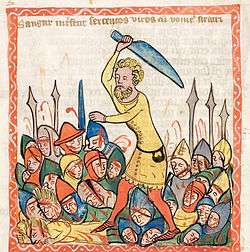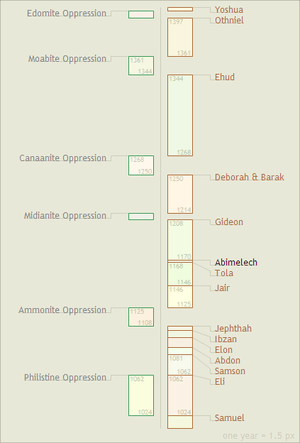Biblical judges
The biblical judges[lower-alpha 1] are described in the Hebrew Bible, and mostly in the Book of Judges, as people who served roles as military leaders in times of crisis, in the period before an Israelite monarchy was established.
| שופטים Judges in the Bible |
|---|
| Italics indicate individuals not explicitly described as judges |
| Pentateuch |
| Book of Joshua |
| Book of Judges |
| First Book of Samuel |
Role

A cyclical pattern is regularly recounted in the Book of Judges to show the need for the various judges: apostasy of the Israelite people, hardship brought on as punishment from God, crying out to the Lord for rescue.[1]
The story of the judges seems to describe successive individuals, each from a different tribe of Israel, described as chosen by God to rescue the people from their enemies and establish justice.
While judge is a literalistic translation of the Hebrew term used in the Masoretic text, the position as described is more one of unelected non-hereditary leadership[2] than that of legal pronouncement. However, Cyrus H. Gordon argued that they may have come from among the hereditary leaders of the fighting, landed and ruling aristocracy, like the kings (basileis) in Homer.[3] Coogan says that they were most likely tribal or local leaders, contrary to the Deuteronomistic historian's portrayal of them as leaders of all of Israel,[4] but Malamat pointed out that in the text, their authority is described as being recognized by local groups or tribes beyond their own.[5]
Historicity and timeline

The biblical scholar Kenneth Kitchen argues that, from the conquest of Canaan by Joshua until the formation of the first Kingdom of Israel and Judah (c. 1150–1025 BCE), the Israelite tribes may have formed a loose confederation. In this conception, no central government would have existed but in times of crisis, the people would have been led by ad hoc chieftains, known as judges (shoftim).[6] However, some scholars are uncertain whether such a role existed in ancient Israel.[7]
Working with the chronology in Judges, Payne points out that although the timescale of Judges is indicated by Jephthah's statement (Judges 11:26) that Israel had occupied the land for around 300 years, some of the judges overlapped one another. Claiming that Deborah's victory has been confirmed as taking place in 1216 from archaeology undertaken at Hazor, he suggests that the period may have lasted from c. 1382 to c. 1063.[8]
Bill T. Arnold and H. G. M. Williamson wrote that if
all the figures given in Judges (years of oppression, years the judges led Israel, years of peace achieved by the judges) are treated as consecutive, then the total duration of the events described in Judges is 410 years. If we accept a date of 1000 BCE for the beginning of David's reign over all Israel, which puts the beginning of Eli's leadership of Israel at about 1100 BCE, then the judges period would begin no later than 1510 BCE – impossible even for those who date the conquest to the fifteenth century BCE[9]
There is also doubt among some scholars about any historicity of the Book of Judges.[10]
Judges mentioned in the Hebrew Bible
In the Hebrew Bible, Moses is described as a shofet over the Israelites and appoints others to whom cases were delegated in accordance with the advice of Jethro, his Midianite father-in-law.[11] The Book of Judges mentions eleven leaders who are said to "judge" Israel: Othniel, Shamgar, Deborah, Gideon, Tola, Jair, Jephthah, Ibzan, Elon, Abdon, and Samson. Ehud, described in the text between Othniel and Shamgar, is never said to judge Israel, but is usually included as a judge because the history of his leadership follows a set pattern characteristic of five of the others.[12] The First Book of Samuel mentions Eli and Samuel, as well as Joel and Abiah (two sons of Samuel). The First Book of Chronicles mentions Kenaniah and his sons. The Second Book of Chronicles mentions Amariah and Zebadiah (son of Ishmael).
The Book of Judges also recounts the story of Abimelech, an illegitimate son of Gideon, who was appointed as a judge-like leader by the citizens of the city of Shechem. He was later overthrown during a local conflict, and the classification of Abimelech as a judge is questionable.[13]
The biblical text does not generally describe these leaders as "a judge", but says that they "judged Israel", using the verb שָׁפַט (š-f-t).[14] Thus, Othniel "judged Israel" (Judges 3:10), Tola "judged Israel twenty-three years" (Judges 10:2), and Jair judged Israel twenty-two years (Judges 10:3).
See also
Notes
- (sing. Hebrew: שופט šōp̄êṭ/shofet, pl. שופטים šōp̄əṭîm/shoftim)
References
- Boling & Nelson 2006.
- Judges 12:7–15.
- Gordon 1962, pp. 296–297.
- Coogan 2009, p. 178.
- Malamat 1971, p. 129.
- Kitchen 2003.
- Thompson 2000, p. 96.
- Payne 1996, pp. 630–631.
- Arnold & Williamson 2005, p. 590.
- Brettler 2002, p. 107; Davies 2006, p. 26; Thompson 2000, p. 96.
- Exodus 18:13–26.
- Parunak, H. Van Dyke (1981). "Oral Typesetting: Some Uses of Biblical Structure". Biblica. 62 (2): 153–168. JSTOR 42706941.
- Judges 9:1-57.
- Hauser 1975.
Bibliography
- Arnold, Bill T.; Williamson, H.G.M. (2005). Dictionary of the Old Testament: Historical Books. Downers Grove, IL: InterVarsity Press. ISBN 978-0-8308-1782-5.CS1 maint: ref=harv (link)
- Boling, Robert G.; Nelson, Richard D. (2006). "Judges". In Attridge, Harold W.; Meeks, Wayne A. (eds.). The HarperCollins Study Bible (rev. ed.). HarperCollins Publishers.CS1 maint: ref=harv (link)
- Brettler, Marc Zvi (2002). The Book of Judges. London: Routledge. ISBN 978-0-415-16216-6.CS1 maint: ref=harv (link)
- Coogan, Michael D. (2009). A Brief Introduction to the Old Testament. New York: Oxford University Press. ISBN 978-0-19-533272-8.CS1 maint: ref=harv (link)
- Davies, Philip R. (2006) [1992]. In Search of "Ancient Israel": A Study in Biblical Origins. London: Continuum. ISBN 978-1-85075-737-5.CS1 maint: ref=harv (link)
- Drum, Walter (1910). . In Herbermann, Charles G.; Pace, Edward A.; Pallen, Condé B.; Shahan, Thomas J.; Wynne, John J. (eds.). Catholic Encyclopedia. 8. New York: Encyclopedia Press (published 1913). pp. 547–549.CS1 maint: ref=harv (link)
This article incorporates text from this public-domain publication. - Gordon, Cyrus H. (1962). Greek and Hebrew Civilizations.CS1 maint: ref=harv (link)
- Hauser, Alan J. (1975). "The 'Minor Judges': A Re-Evaluation". Journal of Biblical Literature. 94 (2): 190–200. doi:10.2307/3265729. ISSN 0021-9231. JSTOR 3265729.CS1 maint: ref=harv (link)
- Kitchen, K. A. (2003). On the Reliability of the Old Testament. Grand Rapids, Michigan: William B. Eerdmans Publishing Company. ISBN 978-0-8028-4960-1.CS1 maint: ref=harv (link)
- Malamat, A. (1971). Mazor, Benjamin (ed.). Judges. Givatayim, Israel: Rutgers University Press. pp. 129–163.CS1 maint: ref=harv (link)
- Payne, J. P. (1996). "Book of Judges". In Marshall, I. Howard; Millard, A. R.; Packer, J. I.; Wiseman, D. J. (eds.). New Bible Dictionary (3rd ed.). Leicester, England: Inter-Varsity Press. ISBN 978-0-8308-1439-8.CS1 maint: ref=harv (link)
- Thompson, Thomas L. (2000). Early History of the Israelite People: From the Written & Archaeological Sources. Leiden, Netherlands: Brill. ISBN 978-90-04-11943-7.CS1 maint: ref=harv (link)
Further reading
- Wolf, C. U. (1962). "Judge". The Interpreter's Dictionary of the Bible. Abingdon Press.